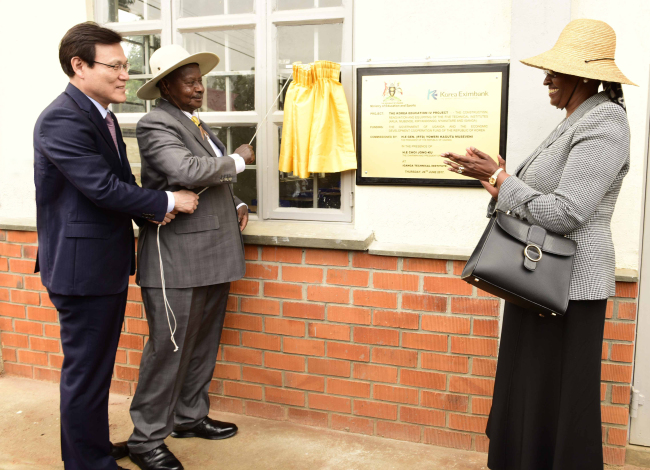The Export-Import Bank of Korea said Friday it held a joint workshop with World Bank to come up with details on how to support agriculture development in Uganda.
The four-day workshop in the capital city of Kampala aimed to further the discussion for the $300 million joint program between the Eximbank’s Economic Development Cooperation Fund and the World Bank to develop the African country’s agriculture, energy, and information, communications and technology sectors during 2015-2019.
The agriculture development program, the first joint project in agriculture, aims to boost productivity and crop sales of 450,000 farms in 12 agriculture clusters in Uganda, the Eximbank said.
Under the program, the World Bank supports the total process of agriculture – production, irrigation, storage and sales, while the EDCF supports building infrastructure for information systems for farming.

The Export-Import Bank of Korea CEO Choi Jong-ku (left) and Uganda President Yoweri Kaguta Museveni (second from left) celebrate the completion of a technical institute, financed through Korea’s Economic Development Cooperation Fund, in Uganda, Thursday. (The Export-Import Bank of Korea)
The World Bank’s spending of $150 million for the agriculture development program has been fixed but the EDCF’s financing has not been decided yet, the state-run policy bank said.
“After making a successful agriculture development program in Uganda with World Bank, I will expand this innovative business model across Africa in the future,” Eximbank CEO Choi Jong-ku said during his keynote speech at the workshop.
Meanwhile, Choi met Uganda President Yoweri Kaguta Museveni on Friday to discuss using Korea’s competitive edge in ICT to boost agriculture development in Uganda where agriculture takes up 26 percent of gross domestic product.
The two also attended a ceremony to celebrate the completion of a technical institute, which was financed both by the Uganada government and the Eximbank’s $27 million EDCF.
The Eximbank’s EDCF supports industrialization and economic growth in developing nations. Since establishing the fund in 1987, the bank has provided 14.8 trillion won for 375 projects in 53 countries as of the end of May.
By Kim Yoon-mi (yoonmi@heraldcorp.com)





![[KH Explains] How should Korea adjust its trade defenses against Chinese EVs?](http://res.heraldm.com/phpwas/restmb_idxmake.php?idx=645&simg=/content/image/2024/04/15/20240415050562_0.jpg&u=20240415144419)
